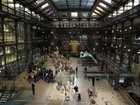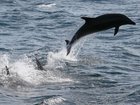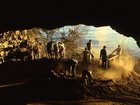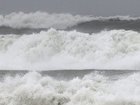One day 370 million years ago, a tiny larva came to a sticky end when it plunged into a shrimp-infested swamp and drowned.
Unearthed in modern-day Belgium, the humble bug now looks set to plug a giant gap in the fossil record.
 Full Story
Full Story
Heartened by a glimpse of what may be the Higgs boson, scientists at the CERN physics lab are smashing particles with new vigor in a quest to understand why matter has mass and other riddles of the natural universe.
Rather than the end of the line, the July 4 unveiling of a boson with Higgs-like characteristics opens new scientific frontiers, enthuse researchers at the Large Hydron Collider near Geneva.
 Full Story
Full Story
Female parrot finches can match their offspring's gender to prevailing living conditions, producing more sons in lean times, scientists in Australia said Wednesday.
The finding presents the first proof for an evolutionary theory that female animals should adjust the sex ratio of their offspring to environmental factors for maximum survival, they wrote.
 Full Story
Full Story
The highly anticipated landing of NASA's sophisticated $2.5 billion rover on Mars will be broadcast on a large screen in New York City's Times Square, NASA said on Tuesday.
The touchdown of the Curiosity rover, equipped with a sophisticated roving toolkit for analyzing the terrain for signs that microbial life once existed, is scheduled for August 6 at 1:31 am Eastern time (0531 GMT).
 Full Story
Full Story
Bottlenose dolphins that have learnt to use sea sponges as hunting tools form cliques with others that do the same -- the first evidence of animal grouping based on mutual interest, a study said Tuesday.
The finding may represent the first known proof of cultural behavior in the animal kingdom, U.S.-based researchers wrote in a paper in Nature Communications.
 Full Story
Full Story
A prominent U.S. skeptic of the human causes of climate change, Richard Muller, has reversed course and said on Monday that he now believes greenhouse gases are responsible for global warming.
"I was not expecting this, but as a scientist, I feel it is my duty to let the evidence change my mind," Muller, a professor of physics at the University of California, Berkeley, said in a statement.
 Full Story
Full Story
The first signs of poison darts and beeswax used in tool making have been found in a South African cave, suggesting that a modern hunter-gatherer culture emerged earlier than previously thought.
Artifacts at the Border Cave, an archeological site on the border of Kwa Zulu Natal and Swaziland, have been reanalyzed and dated to 44,000 years ago, about twice as old as widely believed, said the research in the Proceedings of the National Academy of Sciences.
 Full Story
Full Story
The notion that women and children are rescued first during a shipwreck is a myth, scientists said Monday after analyzing 18 maritime disasters that show men generally save themselves.
The sinking of the Titanic -- in which 70 percent of the women and children on board were saved compared to 20 percent of the men -- is a rare exception to the rule, said the study by Swedish researchers in the Proceedings of the National Academy of Sciences.
 Full Story
Full Story
China will next year attempt to land an exploratory craft on the moon for the first time, state media reported, in the latest project in the country's ambitious space program.
China's third lunar probe will blast off in the second half of 2013, the state Xinhua news agency reported late Monday. Other reports said it would land and transmit back a survey of the moon's surface.
 Full Story
Full Story
Scientists said Sunday they had unraveled the mechanism by which Earth-warming carbon is sucked deep into the Southern Ocean to be safely locked away -- a process that may itself be threatened by climate change.
Wind, eddies and currents work together to create carbon-sucking funnels, said the research team from Britain and Australia in a discovery that adds to the toolkit of scientists attempting climate warming predictions.
 Full Story
Full Story



